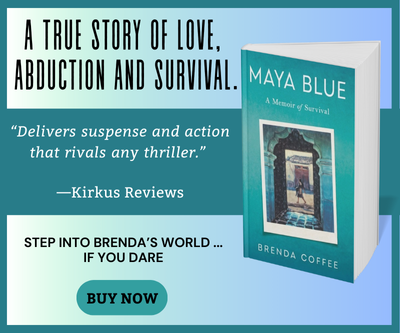One of the first things I thought about when I started writing crime fiction was “whydunnit.” What would it take, I wondered as I began my first thriller, to push me to decide to kill someone? What is a believable motive for murder?
Revenge, I thought. Oh, yes.
We’ve all felt cheated, disappointed, tricked, conned or gaslighted. Ignored, passed over, belittled, unrewarded. We’ve all felt that the world has treated us in some unfair way, that we were robbed or ripped off, that we never win. We never get voted prom queen, or promoted. The love of our lives ran off with someone else. Someone did something to harm us that we deeply wish they hadn’t. And then — we felt the simmering, relentless need to get back at them. Right? Prove to them who really has the power.
“I’ll show you,” a little kid says, as they plant bubble gum on a chair or tattle on a classmate. “You’ll be sorry,” an officemate might say as they plot a rival’s professional demise. Or the scorned lover’s vow: “You can’t get away with that.”
Revenge means the bad guy can rationalize, “It’s not my fault. This is what they deserve.” Because the justification for the murder (or robbery, or deceit, or whatever) is that the other guy started it.
The bad guy can reassure himself: This is what they deserve for what they did to me. They got what was coming to them. And now they’ll know how they made me feel.
And yeah, that’s a thing. When I was researching for my upcoming book The First to Lie (guess what the motive is?), I found a psychological study that showed revenge is most satisfying for the revenger — for as long as it remains satisfying — only if the revengee knows who was behind the action, and realizes why the action was taken. Apparently, anonymous revenge is not emotionally gratifying. The revengee has to be fully aware of how their own actions caused their pain.
Whether it unfolds in a carefully plotted scheme of retribution and payback, or it’s revealed as a shocking twist, in these classics — new and old — revenge is the deliciously relatable motive. And they prove there are more ways to get back at someone than boiling a bunny. Even if we don’t have a dragon tattoo.

Murder on the Orient Express by Agatha Christie
Murder on the Orient Express. Ha. Don’t tell me you saw this ending coming. And the brilliance of Agatha Christie’s seminal revenge mystery is that all of us readers — like Poirot himself — can understand and empathize. Would we have done the same thing?
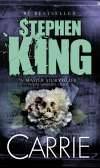
Carrie by Stephen King
Carrie by Stephen King understands every kid’s high school trauma and imbues poor misfit Carrie with the powers we all wish we had. Again, proof that we love revenge, especially against the mean girls, even if we’re simply reading about how someone else carries it out. Pig’s blood. Whoa. Don’t you love it?
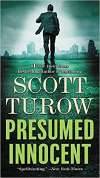
Presumed Innocent. by Scott Turow
Presumed Innocent. So brilliant. Scott Turow pulls off the ultimate in author sleight-of-hand. In this iconic legal thriller, the emotional relationships are unfolding right in front of us, and pointing right at the murderer, but somehow we are looking the other way. And in the end, we gasp. Oh. We should have known. But we didn’t.
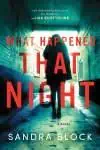
What Happened That Night by Sandra Block
What Happened That Night by Sandra Block handles this volatile subject with care and skill. The physically and emotionally bruised Dahlia is still trying tried to recover her life and equilibrium after a brutal sexual assault — but, because she was drugged, she cannot remember who her assailants were. Then, a video emerges. It shows the entire thing. Even the perpetrators’ faces. And then: it’s Dahlia’s turn.

Why We Lie by Amy Impellizieri
Why We Lie by Amy Impellizieri. Timely and chilling, we realize a female campaign manager needs the opponent to lose more than she needs her own client to win. But why? As her story is compellingly revealed, we begin to understand the heartbreak, and then the scandal, and then the bitter poison of ambition and power.
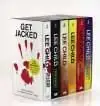
Jack Reacher by Lee Child
All the “Jack Reacher” books. When someone does us wrong, don’t we wish we could call for Lee Child’s itinerant and unstoppable Jack Reacher? A somehow-beloved vigilante, Reacher does everything we know we shouldn’t, but we cheer and applaud him every time. Child’s taut, fast-paced writing makes each of these irresistible. And there’s nothing like a good payback story.
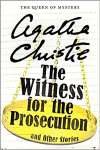
Witness for the Prosecution by Agatha Christie
Witness for the Prosecution by Agatha Christie. This gets me every time. How can I have seen this masterpiece on screen and stage a million times, and still find it so satisfying? The course of true love never runs smooth. Unfaithful spouses, beware. And everyone should get Wilfrid Robarts as their lawyer.
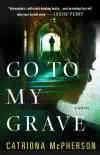
Go to My Grave by Catriona McPherson
Go to My Grave. Catriona McPherson’s unique and riveting voice connects us to the hard-working proprietor of a seaside inn, and we’re rooting for her as the posh weekend guests arrive for a few days of boozy fun. Sure. We’re smart readers, and instantly know something’s burbling under the surface. And wow, we were right. McPherson pulls the rug out in especially delicious ways.
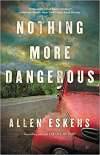
Nothing More Dangerous by Alan Eskens
Nothing More Dangerous by Alan Eskens takes us carefully and honestly into the racial tension of 1976 that twists a small town into angry and simmering factions, and into the minds of the young men who must choose their paths in the bitterly divisive — and destructive — small-town society. This wonderful book shows readers the ugliest nature of revenge — and who has the power to restore justice.
And FYI, if you’re thinking now: yeah, revenge; great idea! I’ll get (you fill in the victim’s name here) back and then I’ll feel better. The same psychologists wondered if that was true and whether revenge actually was satisfying. Their findings: because plotting and planning and executing revenge keep the emotional wounds open, it winds up only making the pain worse. So hey. Be content with simply reading about it.




